Wilt. Shaq. LeBron. Steph Curry? There's a New Definition of Dominance.
Editor’s note: This story was originally published on June 1 and was updated after Stephen Curry and the Warriors won the 2022 NBA Finals on Thursday.
In Jeff Bzdelik’s waking nightmare, Stephen Curry isn’t raining threes from the arc, or the logo, or the Bay Bridge. He isn’t even shooting. At least, not initially. He doesn’t even have the ball.
No, the haunting images are all of Curry running, darting and weaving between Warriors teammates and Rockets defenders, scrambling the schemes Bzdelik and his colleagues worked so hard to devise in the days, weeks and months leading to Game 7 of the 2018 Western Conference finals.
Finally, at the end of all that running and darting and weaving, the ball does indeed find its way to Curry, right there in front of the Rockets’ bench, where the greatest shooter in NBA history calmly rises and drills a dagger three.
In Bzdelik’s retelling, the shot sealed the Warriors’ victory—a final, fatal blow to the Rockets’ title hopes. The box score indicates the play came one quarter earlier. But such is the devastating, anxiety-triggering impact of Curry’s game that even a third-quarter sequence can feel like a dagger.
“We always said that Steph is extremely dangerous once he gives up the ball,” says Bzdelik, the Rockets’ former defensive coordinator, now happily retired. “He might even be more dangerous after he gives up the ball.”
Just ask the Mavericks, Grizzlies and Nuggets, who were all pureed by Curry over six weeks as he powered the Warriors through the Western Conference playoffs and back to the NBA Finals—their sixth in eight seasons. Just ask the Celtics, who witnessed Curry win his fourth NBA championship and his first Finals MVP award after the Warriors defeated Boston in six games.
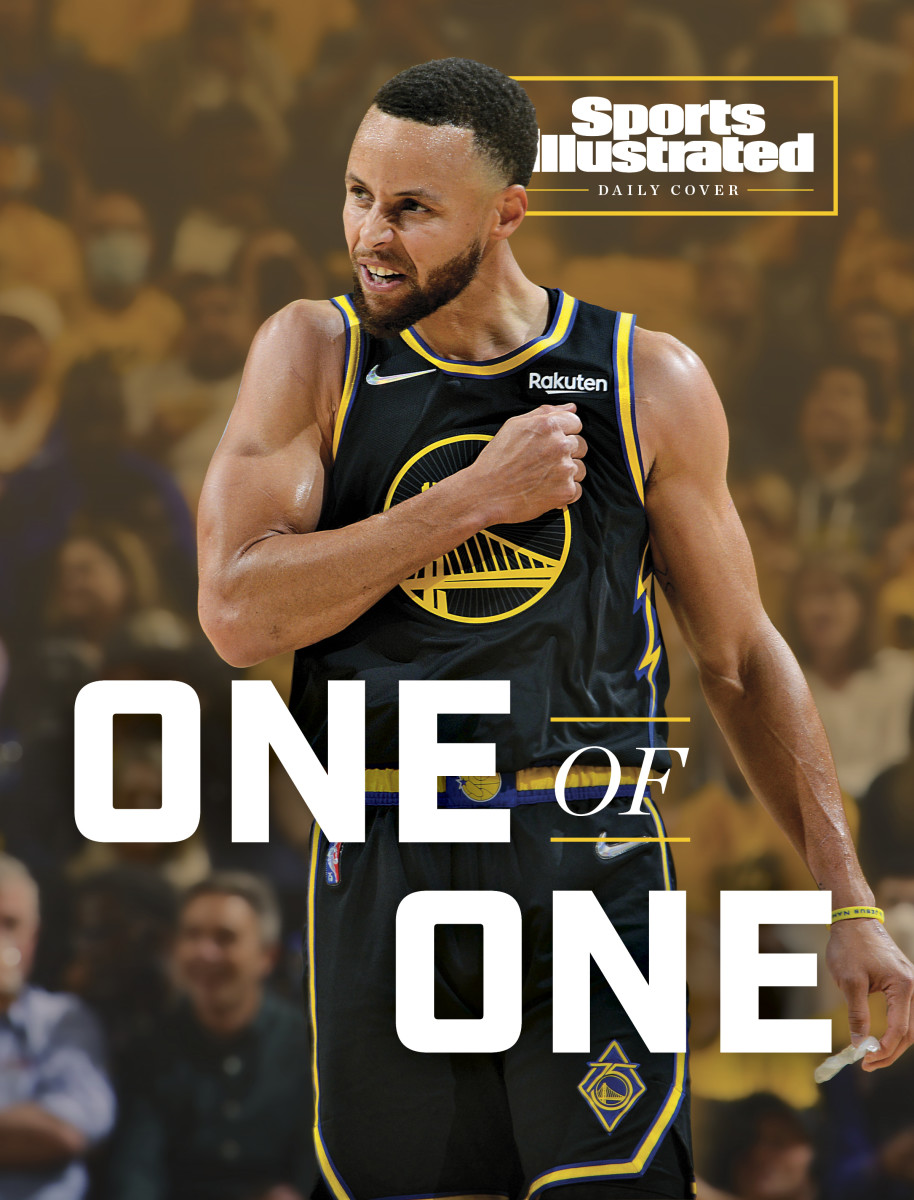
“When you’re sitting there on the opposite bench from him,” Bzdelik says, “you’re always on edge.”
It all feels so familiar by now—Curry dicing up defenses, sinking threes from every angle and every distance, merrily shimmying along the way. He’s been doing it for so long now that it feels routine, expected, even easy. The greatest shooter of all time. That’s what we all call him. It’s a wonderful title, fully earned and undisputed. It also sells him short.
Calling Curry the game’s greatest shooter is like calling Michael Jordan its greatest dunker or Kareem Abdul-Jabbar its greatest skyhook maker. Accurate, sure, but comically insufficient.
“He’s so much more than that,” says Warriors general manager Bob Myers. “I don’t think we properly appreciate him now, as much as he gets.”
To obsess over Curry’s three-point artistry is to miss all the other skills that make him one of the greatest players of his generation—and arguably of all time. It’s his sublime ballhandling, his ability to weave in and out of traffic; his soft finishes at the rim, with either hand; his midrange marksmanship, his balletic assortment of floaters, scoops and step-throughs; his passing and playmaking and court vision; his rebounding (especially for his size); his stout screen-setting (ditto); his knack for drawing double teams, then solving them with a quick pass or shot.
Curry excels at all of it, according to teammates, coaches and rivals. It’s just that we miss the nuances amid the mesmerizing haze of 35-footers.
Indeed, even entering this year’s Finals—after 13 years, five Finals, three championships, two MVP awards and perennial All-NBA accolades—it seemed we still didn’t know how to properly describe, rank or classify Wardell Stephen Curry II.
He’s an all-time great who doesn’t look or play like any who preceded him. He doesn’t crush rivals with power and strength or leap over them or dunk on their heads. (He rarely dunks at all.) He dominates, but he’s rarely called “dominant.” He’s surely the greatest point guard of his time, though he doesn’t have Chris Paul’s assist totals or Russell Westbrook’s triple doubles or Kyrie Irving’s magic handles.
In an era ruled by hybrids and unicorns—LeBron James, Kevin Durant, Kawhi Leonard, Giannis Antetokounmpo—it’s Curry who’s the outlier, standing just 6'2"… and dominating the era anyway.
“Steph’s an anomaly,” says the Warriors’ Draymond Green. “He’s an anomaly. He’s different than anything we’ve ever seen in this league. He’s not Allen Iverson. He’s not Isiah Thomas. He’s not Richard Hamilton. He’s not Ray Allen. He’s not Reggie Miller. He's like some mix of all of those guys, and we've never seen anything like this before.”
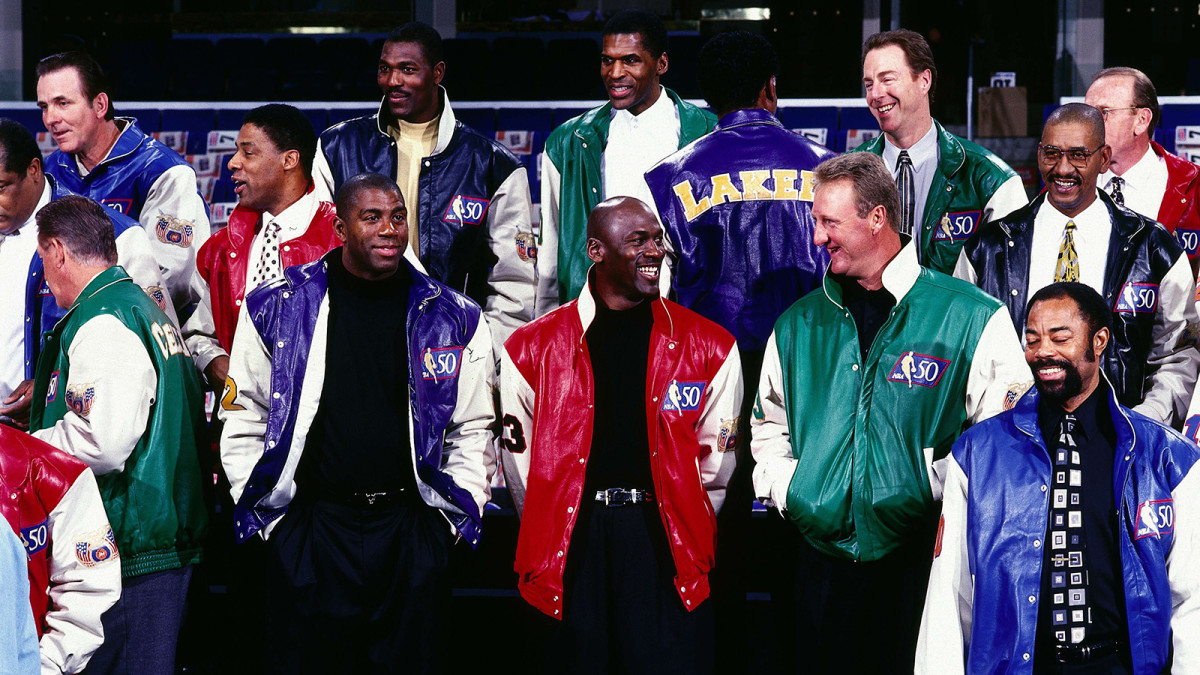
He’s also not Magic or Bird, Jordan or Kobe, Kareem or Shaq, Isiah or Oscar, or any of the standard icons we use to measure modern stars. Curry simultaneously captivates and confounds us—and forces us to reckon with him. And yes, he surely enjoys that confusion.
“I don’t fit the mold of what I guess a traditional great player is,” Curry tells Sports Illustrated. “So I'm aware of all of it.”
When the Warriors and Celtics tipped off the Finals, Curry became just the eighth player in history with six Finals appearances and multiple MVPs, a club that includes Bill Russell, Wilt Chamberlain, Kareem Abdul-Jabbar, Magic Johnson, Michael Jordan, Tim Duncan and LeBron James. Curry is the only member of the group under 6'6".
So while pundits might debate which tier of the proverbial pantheon Curry belongs in—top 10? top 20?—it’s indisputable he belongs somewhere in this discussion. This season just bolstered his case. And this Finals run might be his most impressive to date.
These Warriors are no longer a superteam, no longer an Evil Empire with an obscene collection of talent. Kevin Durant is long gone. Klay Thompson, though still a feared shooter, is now 32, with more surgeries than All-Star appearances over the last three seasons. Draymond Green? Still a force at 32, but hardly the typical co-star. Andrew Wiggins? Salary-dumped by the Timberwolves. Jordan Poole and Kevon Looney? Late first-round picks. Otto Porter and Gary Payton II? Journeymen on minimum contracts.
The Warriors are here again because of Curry, who at 33 is still churning out numbers—27 points, 5.8 assists and 5.1 rebounds per game this postseason—that rival his averages from 2018, the Warriors’ last championship run. His efficiency has dipped some, but his effectiveness remains lethal.
When the Warriors crashed in 2019, amid Durant’s torn Achilles and Thompson’s torn ACL, we wondered whether they would ever rise again. Now Curry has willed them back to prominence, giving the world a chance to appreciate his talents—all of them—anew.
Simple rule for appreciating all the other ways Curry impacts a game: Ignore the ball. Just watch Curry.
Start with the movement, because few guards move as much without the ball as Curry does. It’s why, when Green needs a comparison, he reaches back 20 years and names Hamilton, the former Pistons star, whose entire game was based on catching and shooting off of screens.
“He creates space totally different from anyone else, in large part because he does it a lot without the ball,” Green says of Curry. “The way he creates space off the ball, finds angles, gets himself open, never stops moving.”
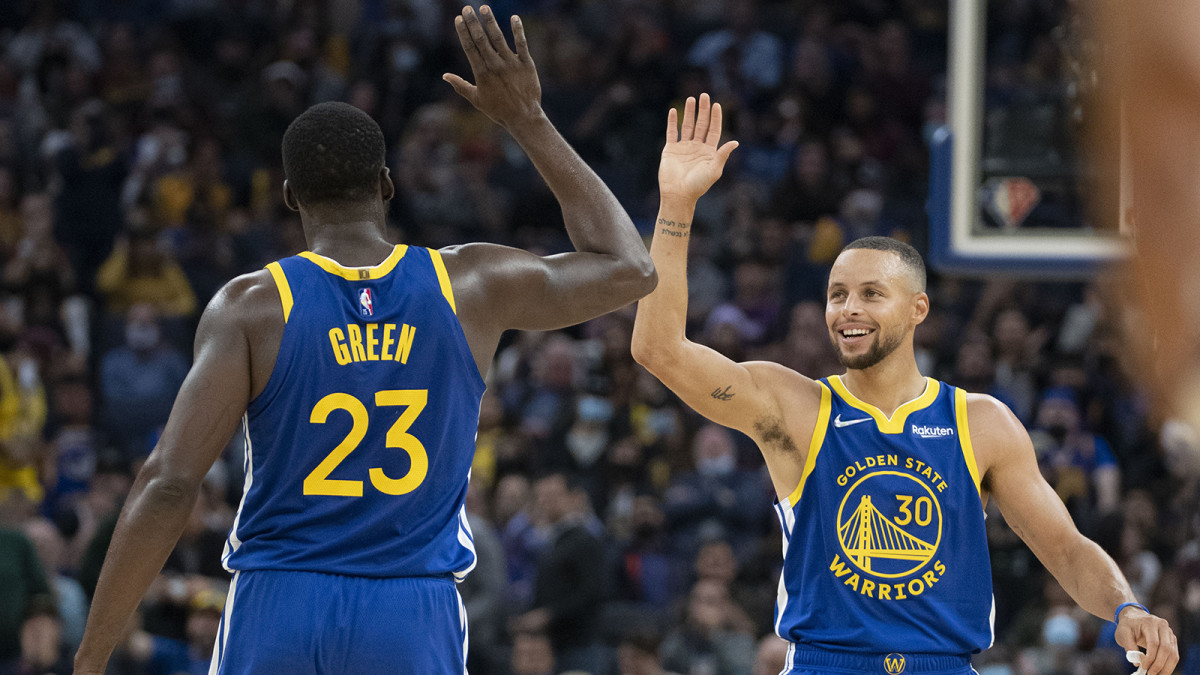
Indeed, according to NBA tracking data, Curry consistently ranks among the top 10 guards in offensive miles per game since 2013–14. (He’s also deceptively quick, with a max speed that ranks in the top tier.)
“The moment you relax,” Green says, “he just continues to move.”
That’s what happened to the Rockets in that Game 7 back in 2018. (Houston also missed 27 straight threes, of course, but that’s another story.) Bzdelik says the Rockets devised their entire switching scheme that year with Curry in mind, knowing they’d need to beat the Warriors to get to the Finals. But Curry would give up the ball, make a quick move or two, then get it back just as his defender exhaled. It happened twice in quick succession in the third quarter that night, each resulting in a Curry three as the Warriors erased a 13-point deficit and took control.
“When he doesn’t have the ball in his hands, he’s just as dangerous, if not more,” says Hawks guard Trae Young. “It’s kind of tough to guard him, unless you want to guard him with two people.”
That’s exactly what teams do, and often, according to an analysis by Krishna Narsu and Saurabh Rane of Bball Index, using data from Second Spectrum and other sources.
Per the analysis, Curry draws multiple defenders without the ball more than almost anyone at his position. He ranked No. 1 among guards in each of his last three full seasons (not counting 2019–20, when he was injured), and has been top five in six of his last eight seasons. From 2013–22, Curry ranked second overall in getting blitzed without the ball in his hands, behind only Kyle Korver.
“You see when he runs off a screen, how two, three guys go with him—and somebody will get a wide-open dunk or a wide-open shot,” says Warriors star Klay Thompson.
The same, of course, is true when Curry does have the ball, because he’s rarely guarded with just one defender. His knack for drawing so much attention—his so-called gravity—is truly elite, per the analysis by Narsu and Rane. Curry ranks No. 1 in “pick-and-roll aggression-plus,” a metric that quantifies gravity by measuring how defenses guard the player, from the 2013–14 through ’21–22 seasons, among all guards who met certain statistical minimums. Over the same span, Curry ranks second in getting blitzed on dribble handoffs, behind only Damian Lillard.
Asked about his gravity, Curry says it’s the element “I take the most pride in.”
“I get a kick out of during games, where you want to see just how outside the box people will go to defend you different types of ways,” Curry says. “And almost using that as kind of like entertainment in the game, where I'll start laughing to myself. I'm standing around halfcourt, and somebody is just face-guarding you, not really caring about anything else going on behind them. And the gravity then helps everybody else [get open shots].”
In fact, operating in a crowd is often when Curry is at his best, according to coach Steve Kerr.
“His ability to get the ball out of a blitz is amazing,” Kerr says. “All the four-on-threes [we get], where Draymond is putting the ball on the floor and either attacking the rim or throwing the lob or spraying it out to the perimeter—most of those are because people blitz Steph. And he's so good at getting the ball out of the blitz to the right guy to allow the next part of the play to happen.”
There are other, even less obvious talents in play.
“I think the underrated part is his screening,” says Mavericks star Luka Dončić, “because nobody wants to get off him. So when he sets a good screen, it’s tough for the defense.”

Indeed, he’s perennially among the leaders among all guards in the frequency and quality of off-ball screens he sets, per Bball Index.
And then there’s Curry’s defense, once a subject of criticism and even derision. And now, a relative strength. By his own assessment, Curry says it’s the area he’s improved the most since his rookie season.
“He’s a much better defender than people think,” says Warriors veteran Andre Iguodala, and the advanced stats confirm it. From 2013 through this season, among all players 6'5" or below, Curry ranked a solid 33rd out of 517 players in DRAPM (defensive real adjusted plus-minus)—and the numbers indicate he was particularly effective this season.
And the list goes on and on. Curry’s midrange game. His finishing ability. His passing and playmaking. His handle. His rebounding. Teammates and rivals will tell you it all ranks among the best. The stats generally confirm it.
And then there’s this: Run the plus-minus numbers for every player, of every size, shape and skill set since 2011, and one star emerges with a clear, significant lead over the entire league: Steph Curry.
Believe it or not, it was Curry’s shooting—yes, that thing he does better than anyone ever—that once seemed like an afterthought. It was in high school, at Charlotte Christian in North Carolina. And it was Curry himself who made it that way.
“I was a pass-first point guard type player,” he says. “They had to tell me to shoot more. … I got a lot of joy from getting everybody else involved.”
Of course, his shooting was elite, even then. And of course, as the story goes, Curry was lightly recruited by the big-time basketball programs despite his obvious talents, and despite the fans packing every gym he played in. It’s how he ended up at tiny Davidson College. Underestimated? Undersold? Underappreciated? Those adjectives, those themes, have been a staple of Curry’s bio for his entire adult life, even as he’s collected enough hardware to fill a Home Depot.
Even after all this time, it still defines and fuels him.
“That’s always part of the DNA and what carries me through,” Curry says. “But it gets to a point where it gets really hard to articulate that to people, [that] no matter how many successes you have, you still feel underrated. And the fact that like, you can't walk into a room, like ‘I got three rings,’ and still say you're underrated—even though I still feel like that. Weird, weird vibe.”
So when Curry declares, in an NBA television ad, “From underrated … to undeniable,” we know exactly what he means. He embraces both poles, accepting that both descriptions apply simultaneously. Just look to another Curry ad, the car commercial where he asks, with mock indignation, “What’s wrong with being the seventh pick?”
“It's weird,” Curry says, “when I was the seventh pick, it was like, ‘Oh, [he] was overlooked,’ because I was the third point guard—I guess James [Harden] is a point guard—I was the fourth point guard picked. Still, you’re like top seven; that's not really underrated,” he says, chuckling. “But for me, it’s like that still was the chip I had from jump, so it kind of carried ever since.”
Let’s try this as a Rorschach test of sorts: Picture Steph Curry, and tell us the first words or phrases that come to mind.
“Unguardable,” says All-Star Trae Young.
“One of a kind,” says All-Star Rudy Gobert.
“Unbelievable,” says All-Star Fred VanVleet.
“Unbelievably amazing,” says All-Star Luka Dončić.
“Unreal,” says All-Star Darius Garland.
“Electric … dynamic … crafty,” says All-Star Khris Middleton.
“The best tough-shot maker in NBA history,” says All-Star Karl-Anthony Towns.
“Historical,” says two-time MVP Nikola Jokić.
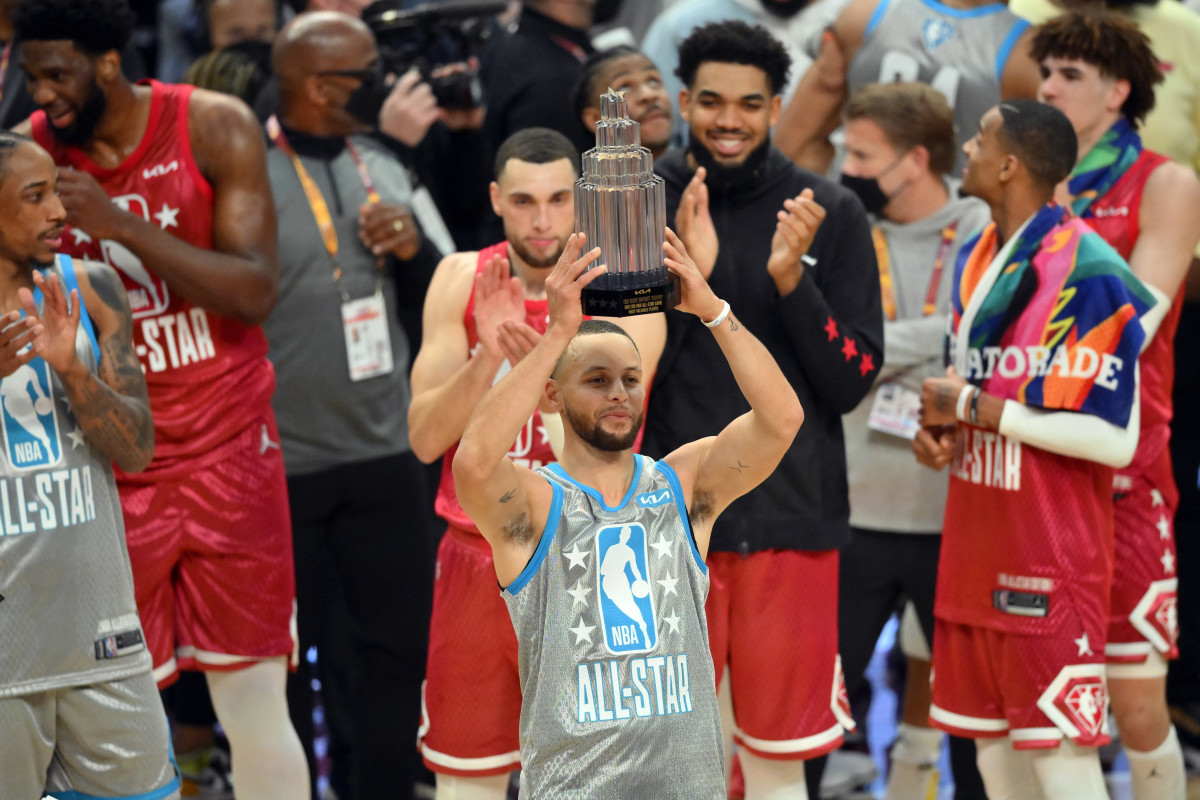
Quiz Curry’s peers, and you’ll hear lots of admiration and adjectives like these, with one notable word missing: dominant.
For decades, that’s been our go-to descriptor for the greatest of the greats, from Wilt Chamberlain to Kareem Abdul-Jabbar, Magic Johnson to Larry Bird, Michael Jordan to Kobe Bryant to LeBron James. When Shaquille O’Neal was in his prime and striving to distinguish himself from all the other greats, he created his own honorific: Most Dominant Ever, or M.D.E.
Like Shaq himself, the word “dominant” is big and brawny, infused with machismo and aggression, which is generally how we like our NBA stars. For decades, the game has been ruled by giants or explosive athletes—the guys who don’t just score on you, but humiliate and lord over you with their physical prowess.
But Steph? He’s the baby-faced assassin, strafing opponents from long range or slipping by them, dominating the scoreboard but not “dominating” in any familiar way. Which means, for some observers, he can’t join that most exclusive tier of the pantheon.
“I wouldn’t say ‘dominate,’” says O’Neal, even while praising Curry as “the greatest shooter of all time.” In O’Neal’s framing, Curry leads his own wing, the room with Ray Allen and Reggie Miller and other legendary snipers, just outside the great hall.
Even in his own time, Curry has often suffered from comparisons to guards who are more physically imposing, more ball dominant, more ardently alpha—Westbrook, Harden, Irving, Derrick Rose.
But Myers suggests the old definitions are crumbling, with Curry leading the charge. “That word [dominant] is usually applied to a more physical force. That doesn’t make it right,” he says.
Green is even more emphatic. “Have you ever seen what he does to a defense?” he asks about Curry, his voice rising. “That is dominance.”
“The whole NBA is playing a brand of basketball created by the ideology of Steph Curry,” Green says. “And you tell me that’s not dominance? You tell me that’s not sitting along the same lines of the greats? I'm sorry—no disrespect to other guards that have come before him—but the majority of guards don’t have an era that they defined the way that era of basketball was played.”
Consider the statistical company Curry now keeps. In March, he cracked the 20,000-point club, a distinction shared by 49 players in history, only six of whom are under 6'4". If Curry averages 1,600 points the next three seasons, he’ll join the 25,000-point club, which currently has 23 members, only one of whom—Jerry West—is under 6'5".
Or consider this stat from Meadowlark Media’s Tom Haberstroh ahead of the Finals: With a 21–4 record in playoff series, Curry now has a better winning percentage (.840) than MJ, LeBron, Kareem, Bird or Magic. His 83–39 record in playoff games produces a better winning percentage (.695) than any MVP in history (minimum 50 games).
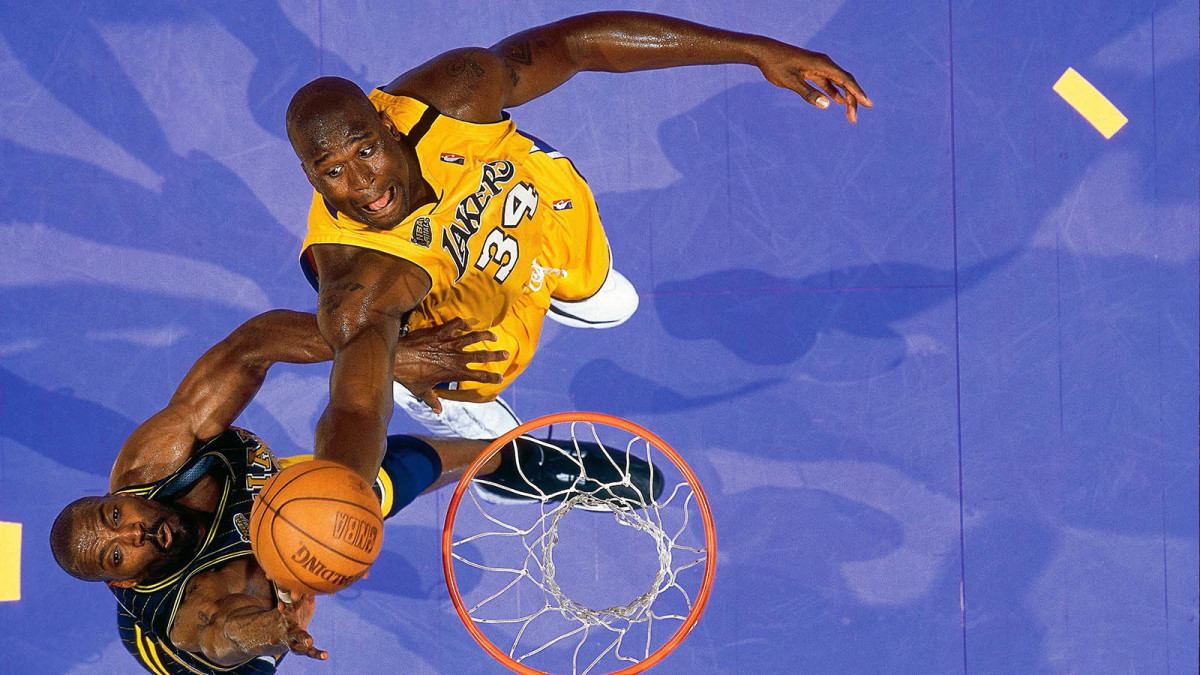
“To have a guy as little as he is do that, in a league of big, strong guys, it’s amazing,” O’Neal says. “Every time I see Steph, I don't see a lot of muscle. I don’t see a big, brawny chest. I don’t see big shoulders. I know he’s 30-something, but he still looks like a little kid. But the way he just dom—well, not dominates—the way he just takes over games.”
See, even the M.D.E. struggles with the question.
In Jason Kidd’s waking nightmare, Stephen Curry isn’t raining threes from the arc, or the logo, or the Bay Bridge. He doesn’t even have the ball.
Met by three defenders in the lane, Curry has just zipped a pass out to Otto Porter Jr. at the arc. But now Porter is swinging a pass to Andrew Wiggins in the corner. And Wiggins is driving past Luka Dončić, then zinging the ball out toward the opposite side, where Curry, having curled to the baseline and back around, has just popped out at the arc, ready to catch the pass. Rise, fire, swish. All before Spencer Dinwiddie can reach him.
The sequence came in the first quarter of the Warriors’ Game 2 victory over Dallas in the conference finals. You could find versions of it, again and again, throughout the series—the same haunting specter that has kept coaching staffs fretting into the night for the last eight years.
“Steph is the best conditioned athlete in this game,” Kidd said that same night, “and he never stops moving.”
Thirteen years in, Curry is still stretching defenses to their limits—and our imaginations, too. Thirteen years in, he’s still forcing us to reconsider what dominance means, what an all-time great looks like, what a good shot looks like, how far is too far.
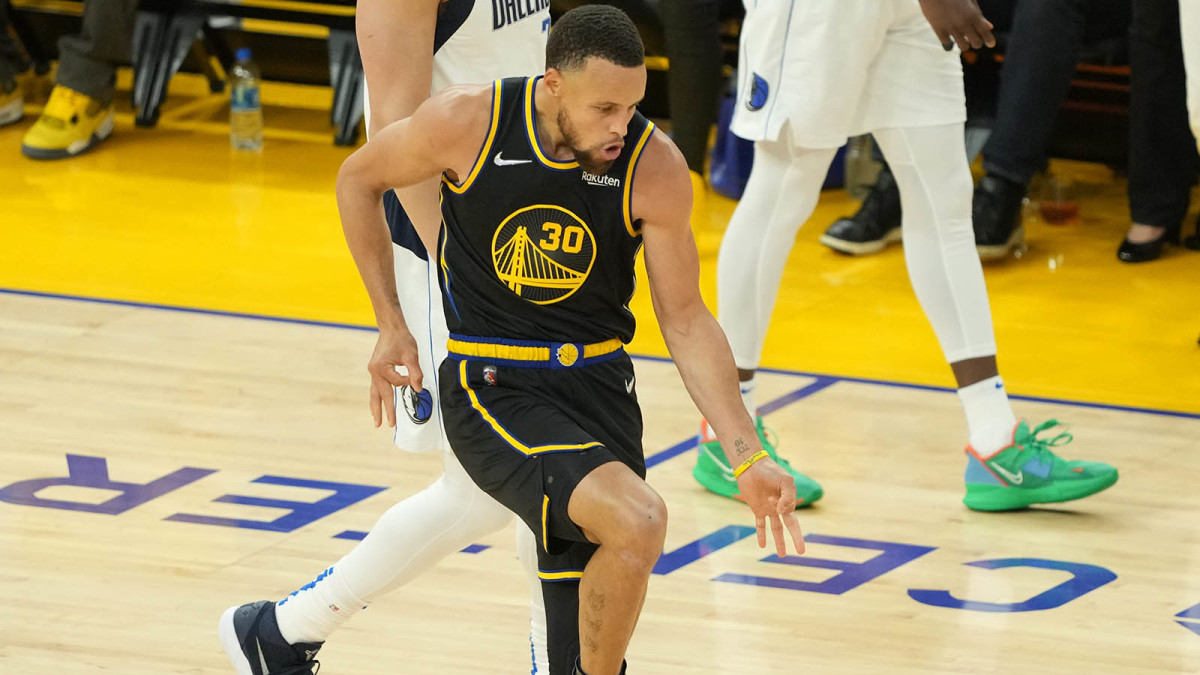
“If you look back forever, there’s nobody who plays like him,” says ESPN’s Hubie Brown, who has witnessed most of NBA history as a coach or analyst. “There’s nobody that size, that can shoot from that distance, shoot that percentage, go to the foul line, shoot over 90 [percent], handle the basketball like it’s part of his hand and move to wherever he wants to go and keep you off balance as a defender.”
Is all that skill and guile enough to crack the inner sanctum of the NBA pantheon? Can Curry take a seat somewhere between Robertson and Russell, West and Wilt, Shaq and Kobe? Does he need to win this Finals (and MVP) to gain passage? Is he already there? Brown demurs. These are eye-of-the-beholder questions.
“He’s one of one,” says Klay Thompson, “and there won’t be another player like him. And his impact will last for generations. So right now, I don't think he might get the credit like those other greats have gotten before, but he also still has many chapters to write of his story.”
What is clear, once more, is that Curry is a defining figure of this era, as much as LeBron or Durant or anyone else who towers over him. Maybe the Warriors’ two-year playoff absence dulled our memories. Maybe the three years Curry shared leading-man duties with Durant skewed our perceptions—both enhancing and obscuring his legacy. Maybe we all needed a vivid reminder.
Which is what made this season so exhilarating and vital. There are no caveats and no KDs muddying the waters. Just Curry, playing again like an MVP, with an entirely revamped roster, reviving a dormant dynasty.
Or maybe we’re all overthinking this. Maybe, as Brown gently notes, it’s as simple as this: Whenever Curry elevates, no matter where he is, “You think it’s going in. And that kid whose family brought him to the game feels in his heart that ball’s going in.”
Is dominance just a function of stats and stature? Is greatness measured only in rings and gold balls? Or is there something more to it, something both essential and ineffable?
“I would put him up against any player that ever played as far as how he has made people feel,” says Bob Myers. “A lot of people say he’s worth the price of admission. That is greatness to me. And he’s got championships, and he’s got pedigree, and he’s got records. You think of players that you remember, and why do you remember them? Because in my opinion, they made you feel a certain way. And he makes people feel a lot of different emotions. And I think that he’s one of the best ever to do that.”
More SI Daily Covers:
• The Warriors’ Daring Quest to Extend Dynasty Run
• Heat’s Erik Spoelstra Is at the Peak of His Powers
• Does the NBA Have a Profanity Problem?
